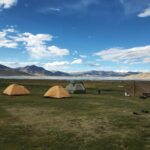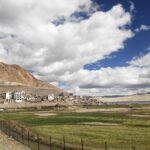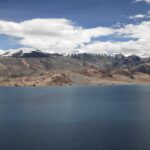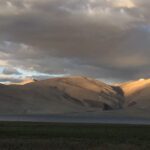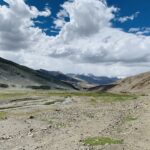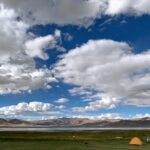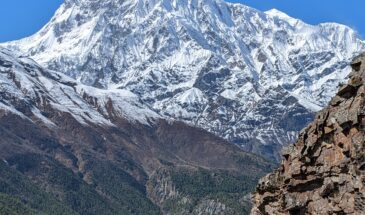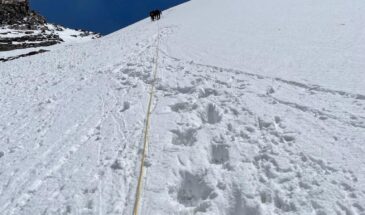- Trek Overview
- Itinerary
- Inclusions / Exclusions
- Gallery
- FAQ
About the trek –
The Rumtse to Tsomoriri trek puts on exhibition all that Changthang has to offer! From scenic revelations to high altitude passes (you cross 7 passes close to or above 5000 mts on this trek!), to the chance of spotting rare species of wildlife like Argalis, Blacknecked crane and Kiangs and finally to experience camping on the shores of two of the most beautiful alpine lakes (Tso kar and Tso moriri); this trek is a complete package! Long walks and high altitudes make it an extremely challenging trek. One requires high fitness levels to be able to competently complete this trek
A short detour from Kerzog gives you access to the Mentok Kangri base camp. Mentok is a semi technical peak and is apt for experienced trekkers who want to get an introduction to mountaineering!
The area: – Ladakh is bordered by the Greater Himalayas in the west and south, the Karakoram in the north and the Tibetean Plateau in the east. These ranges form a natural barrier and does not allow clouds to enter this valley making it a rain shadow region and thus a cold desert. The term Ladakh translates to land of high passes. Some of the highest motorable roads in the world are here. Ladakh is a major tourist destination in the summers.
Expected weather –
- Chances of rain/Hail – Chances of rain is very less. One can expect a mild occasional drizzle. Ladakh/Spiti is a rain shadow region and hardly gets any rainfall.
- Snowfall – Possible in August, September on the pass day
- Temperatures – The temperature is a lot cooler in this region as compared to other areas in the Himalayas. Afternoon – upto 20 degrees
Nights – around zero degrees (June) and -12 degrees (September end)
- Day 1: Arrive in Leh. Check into a hotel. Rest day.
- Day 2: Acclimatization day at Leh.
- Day 3: Drive from Leh to Rumtse, Trek to Kyamar (4538 mts) ; Trek Distance - 11 Kms; 4 hours. Stay in camps.
Day 4: Trek from Kyamar to Tisaling (4940 mts) via Kyamar La (5071 mts) and Mandalchan La (5206 mts) ; Trek Distance - 14 Kms; 8 hours. - Day 5: Trek from Tisaling to Ponganagu (4651 mts) via Shibuk la (5275 mts) ; Trek Distance -14 kms; 7 hours
- Day 6: Trek from Ponganagu to Nuruchan (4679 mts) ; Trek Distance - 18 kms; 7 hours
- Day 7: Trek from Nuruchan to Gyamar Barma (5190 mts) via Kyamayuri La (5410 mts); Trek Distance - 19 kms; 9 hours
- Day 8: Trek from Gyamar Barma to Gyamar (5150 mts) via Kartse La (5384 mts); Trek Distance - 6 kms; 4 hours
- Day 9: Trek from Gyamar to Korzok (4550 mts) via Yalung Nyau La (5435 mts); Trek Distance - 16 kms; 7 hours. Camp at Korzok Phu.
- Day 10: Trek from Korzok (4550 mts) to Mentok Base camp (5010 mts); Trek Distance - 12 kms; 7 hours. Camp at Mentok Base camp.
- Day 11: Rest day and start for the Summit attempt at night. We should summit the peak at dawn; Trek Distance - 10 kms; 8 hours. Camp at Mentok Base camp.
- Day 12: Trek to Korzok and Drive to Leh (6 hours). Night stay in hotel.
- Day 13: Trek ends post breakfast. Drop arranged to Airport.
- Complete Stay and Accommodation (Twin/Triple sharing basis) for the entire duration of the trek.
- Transport from Leh to Rumtse and Korzog to Leh
- Food from the first day to the last day of the trek (barring lunch in Leh).
- Hotel stay in Leh.
- Airport /Bus stand Pickup. (On trek specific dates only. Note you have to manage your travel yourself if you come early and leave later)
- Rentals for all common gear provided to you like tent, sleeping bags, crampons etc.
- Forest entry permission and camping charges.
- Guide and expertise charges.
Manali is well connected from Delhi/ Chandigarh. You have regular bus service from both Delhi and Chandigarh. The nearest airport is Kullu. One can take a cab from Kullu to Manali which costs approximately 2000INR. You also get regular bus service from Kullu to Manali. Note, it is advisable to book a cab to avoid inconvenience.
A certified trek leader, a guide, cook & porters will accompany you during the trek
The common perception is that alcohol makes you feel warmer, however it also dehydrates you & dehydration can be fatal while trekking. Hence consumption of alcohol is prohibited. Smoking in camps is not allowed.
Wild animals do not frequent camps. They tend to stay away
We've been organizing treks for over two years and have had many female trekkers on our treks. In fact, a lot of them come solo for treks. There has never been a complaint about the atmosphere of a trek, about other trekkers or our professionalism. They have all been kind enough to leave a review on our website
In all the camps where the accommodation is in guest houses/home stays, there will be proper toilets. On the day of camping, we will have toilet tents, the standard, most hygienic way of answering nature’s call. A deep pit will be dug in the ground and once you’re done, you will have to use a shovel & throw in some dirt from a mound of dirt kept nearby. These will be dry toilets with no water hence please carry tissue roll for the toilet tent (refrain from using wet wipes as they are not bio degradable), for the rest of the days, you can carry rolls as per your convenience.
Yes, you are ideally expected to carry your backpack. But you do have an option of offloading your bags on a mule for an additional cost. The cost will be 400/ per day per bag. One is expected to inform us about offloading 1 week prior to the trek

